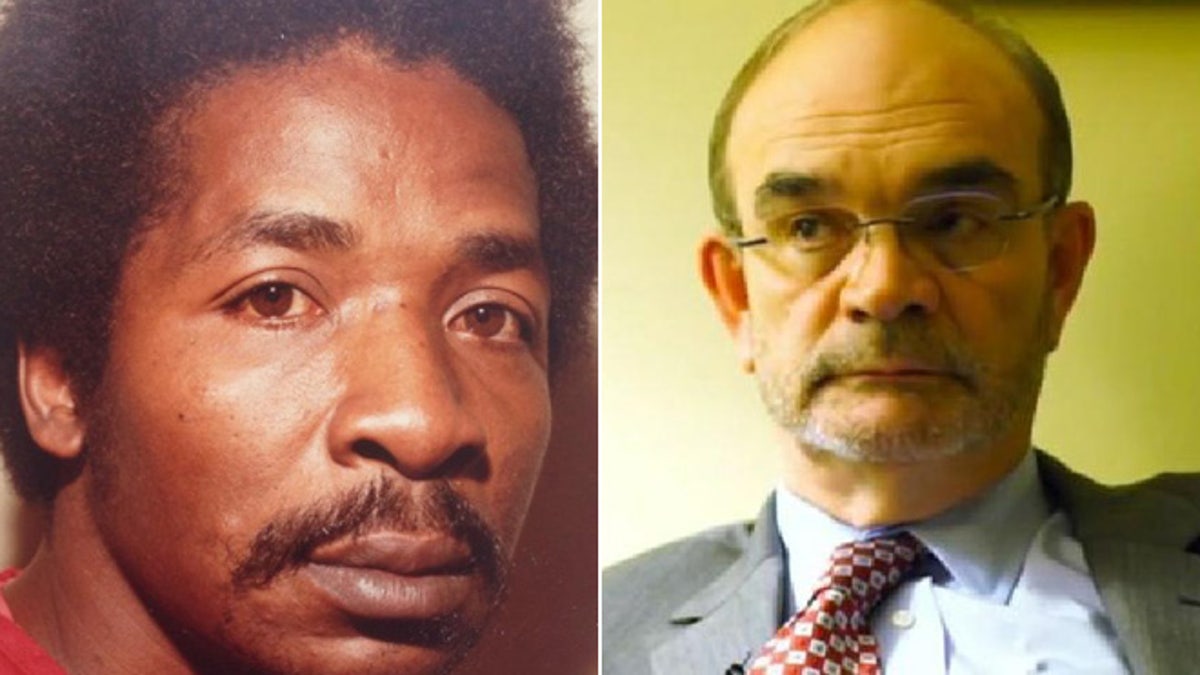
Glenn Ford, left, Prosecutor Marty Stroud, right. (Caddo Parish Indigent Defender Office, left, ABC News, right, via News.com.au)
After 30 years wrongfully imprisoned for murder on death row, Glenn Ford was released with a $30 gift card.
Under Louisiana law, Ford was entitled more than $400,000 in compensation for the time he spent in solitary confinement at notorious maximum-security facility Angola. Instead, he died penniless on the street.
In an astonishing interview on CBS’s 60 Minutes, the prosecutor who convicted him said the mistake had ruined both their lives. “I did something that was very, very bad,” Marty Stroud told the TV show. “I was arrogant, narcissistic, caught up in the culture of winning.”
Stroud, then 32, helped to convict Ford of robbing and murdering jeweller Isadore Rozeman, for which he was sentenced to death in 1984. Ford had done yard work for Rozeman and was known to be a petty thief. He had even pawned some of the stolen jewellery. But was it enough to convict?
No weapon or witness put Ford at the scene. Stroud admitted a number of mistakes were made during the case. “There was a question about other people’s involvement,” he said. “I should have followed up on that. I think my failure to say something can only be described as cowardice. I was a coward.”
Ford’s court-appointed lawyers had no experience of criminal law, with backgrounds in wills and estates.
“I snickered from time to time saying … we’re going to get though this case pretty quickly,” Stroud said.
There were no African Americans on the jury. “I felt that they would not consider a death penalty where you had a black defendant and a white victim,” Stroud said. “I was wrong.”
It took the jury less than three hours to find Ford guilty. Afterwards, Stroud went out to celebrate with drinks, songs and slaps on the back, a performance he now calls “disgusting”.
While Stroud’s career soared after the case, Ford became one of America’s longest-serving death-row inmates, locked up alone in cramped conditions and often searing temperatures for three decades. At one point, he was a week from execution.
But he survived, thanks to a miracle: the real murderer, Jake Robinson, confessed to a police informant. A court review found no evidence to show Ford had anything to do with the robbery or killing, and he was released last year.
Stroud said he thought he was going to be sick when he heard the news.
But it was worse for Ford. He was free, but he had nothing. His $30 gift card and good wishes from the prison bought him a meal of fried chicken, fries and tea, with $5 change.
Lawyers in the original trial said Ford had known the jewellery store was going to be robbed and didn’t report it. The father of four was never charged with that crime, but it was enough to refuse him any compensation.
He moved into a home for released prisoners in New Orleans. Soon afterwards, he learned he had an aggressive form of lung cancer. For the last few months of his life, he survived off charity, and donations covered the funeral.
Ford is one of 10 death-row inmates in Louisiana who have been exonerated, and one of 149 freed across the US since the Supreme Court reinstated capital punishment in 1976. But Dale Cox, the acting district attorney who secured
Ford’s release, said he didn’t believe the system had failed, telling 60 Minutes that prosecutors and lawyers were “not in the compassion business”.
Stroud went to see Ford to apologise, but he didn’t get forgiveness, and he’s not sure he would have given it in the same situation. Three weeks before he died in a hospice in June, 65-year-old Ford said of Stroud: “He didn’t only take from me, he took from my whole family.”
It’s the mistake the prosecutor will regret forever. It’s he who now has the life sentence.









































